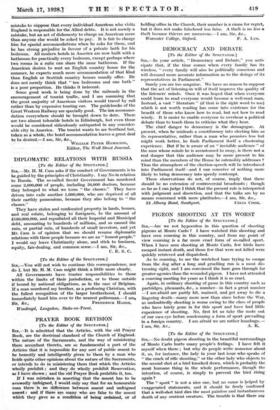DEMOCRACY AND DEBATE
[To the Editor of the SPECTATOR.]
SIR,—In your article, "Democracy and Debate," you anti- cipate that, if the time comes when every family has its wireless, "every family will also be politically conscious and will demand more accurate information as to the doings of its representatives in Parliament".
Surely you are too sanguine. We have no reason to suppose that the act of listening-in will of itself improve the quality of the listeners' minds. Once it was hoped that when everyone could learn to read everyone would become a well-read man. Instead, a vast " literature " (if that is the right word to use) which is not worth reading has come into existence for the benefit of those who know how to read, but not how to read wisely. It is easier to enable everyone to overhear a political debate than to teach them to criticize what they hear.
The chief danger to democracy is the demagogue. At present, when he misleads a constituency into electing him as its representative, rather than a man who promises less but might work better, he finds Parliament itself a chastening experience. But if he is aware of an " invisible audience" of the men whose minds he is accustomed to sway, is there not a real danger that this audience may be more present to his mind than the members of the House he ostensibly addresses ? Thus the atmosphere of the election-speech will be introduced into Parliament itself—and I can conceive of nothing more likely to bring democracy -into speedy contempt.
These observations do not, of course, imply that there should be no extension of controversial broadcasts ; though so far as I can judge I think that the present rule is interpreted with judgment and discretion, and that the talks are by no means concerned with mere platitudes.—I am, Sir, &c.,










































 Previous page
Previous page